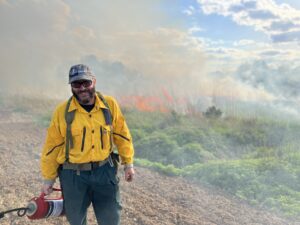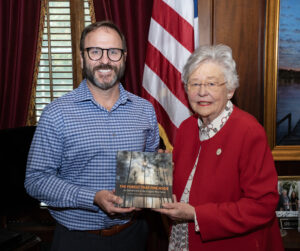
John McGuire helps conduct a prescribed burn.
From the Pacific Northwest to the southeast, forest management has captivated Auburn University College of Forestry, Wildlife and Environment (CFWE) alumnus John McGuire.
What once was a silvicultural sabbatical has turned into a dream career working with forests and utilizing prescribed fire as an essential management tool.
The seeds of McGuire’s fascination with forests were sown at an early age. A resident of Bainbridge, Georgia, he was not a stranger to the importance or presence of forestry in the South. His curiosity for forestry led him to explore new experiences while acquiring degrees at Washington State University (WSU).
“Under the counsel of my advisor at WSU, I traveled South to learn about prescribed fire,” McGuire said. “My intent at the time was to spend a few years to learn about fire and forest management and bring that knowledge back to Washington to work in the dry forests (such as ponderosa pine), grasslands and scrublands of eastern Washington, Oregon and Idaho.”
He adds that the Pacific Northwest’s dry forests share similar needs with longleaf pine forests for frequent, low-intensity fire to help manage natural competition, soil nutrients and forest litter that serves as fuel for large wildfires.
For McGuire, the extension of this hiatus to work in the southeastern longleaf pine ecosystems irrevocably shaped his life and career.
“My attachment to longleaf pine forests has gone on too long to sever, and I call these forests and the South my home now,” McGuire said. “Fire has always been a central theme in my professional and academic career and that spark was ignited in White-Smith Hall (the previous home of the CFWE) at Auburn many years ago.”
A career-driven education
Upon arriving at what was then Auburn’s School of Forestry, McGuire enjoyed the school’s intimate setting and the many mentors and colleagues he met along the journey. While earning his Master of Science in Forestry at Auburn in 1999, he conducted silviculture research and learned about wildlife habitat management.
“Under the guidance of Auburn forestry faculty and staff like Dr. Dean Gjerstad, Rhett Johnson, Dr. John Kush, Kent Hanby and others, my appreciation of the recovery of fire-dependent forests and the application of fire blossomed,” McGuire said.
These mentors were critical to McGuire’s progression through forestry research, and the relationships formed during this time are still important to him today.
“John is driven,” said John Kush, retired CFWE forest ecology research fellow and instructor. “He is driven to keep his word, which seems to be rare today. John understands the critical need for fire from the safety perspective as well as from the ecosystem perspective. I have been very fortunate in that John has stayed in touch with me since he moved away from Auburn. He has helped me and so many others to spread the word about fire.”
As a member of the Xi Sigma Pi honor society and Society of American Foresters, McGuire began to appreciate the need for sound forestry research as well as the art of land management.
Today, McGuire is the director of the Private Lands Fire Initiative at Tall Timbers, Inc., located in Tallahassee, Florida. As a landmark organization in the southeast for fire ecology and forest management research, their mission is to foster exemplary land stewardship through research, conservation and education.
“My interests and responsibilities revolve around trying to maintain a culture of prescribed burning and to increase the scale of prescribed burning in both the southeast and nationally,” McGuire said. “This includes working with a dedicated staff (including several Auburn graduates) in outreach, training and implementation of prescribed burning.”
McGuire’s office now sits in the center of a 4,000-acre forest, which he says is among some of the last geographic vestiges where old-growth longleaf pine forests can be found. The location gives him abundant opportunities to assist with prescribed fire and to admire the diverse wildlife that inhabit the region’s forests and grasslands.

John McGuire is shown with Alabama Governor Kay Ivey, who recognized his co-authored book, “The Forest that Fire Made.”
Conservation inspires career, new book
Drawing from his life’s passion and admiration of the longleaf ecosystem, McGuire recently published a book titled “The Forest that Fire Made.” Co-written with Carol Denhof and Byron Levan, the book serves as a historical account and introduction to the common species of plants, animals and insects found within the once-vast forests and the ecological processes they depend upon for their survival.
“Over the past 20 years, John has been my student, employee, friend and valued colleague,” said Rhett Johnson, retired CFWE director of the Solon Dixon Forestry Education Center, who wrote the book’s foreword.
“He took advantage of every opportunity to learn new skills, becoming knowledgeable in natural regeneration techniques, vegetation management, wildlife management, and especially fire ecology and history,” said Johnson. “His interest in the history of the longleaf forest and its role in the history of the region was extremely helpful in spreading the story of that forest to a wide array of audiences.”
Reflecting on the journey
Many of McGuire’s college contemporaries are still friends and business associates. Throughout his tenure as a land steward expert, he has valued his relationships and alliances, as well as their opinions. His affinity for Auburn and the forestry program gives him a sense of fraternity that he carries with him today.
“The science of forestry and fire management was taught well at Auburn,” McGuire said. “I know what the program represents and what it takes to get a degree from Auburn. I may look more intently at a prospective employee solely because they’ve graduated in forestry or wildlife from there.”
Owing to this lineage, McGuire’s new book serves as tribute to his alma mater and those who helped him along the way.
As an extension of these influences and his life’s work, McGuire hopes the book will inspire greater public understanding and appreciation of longleaf pine ecosystems and the vital importance of prescribed fire to the species’ survival.
(Written by Cole Sikes)









